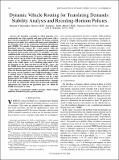| dc.contributor.author | Bopardikar, Shaunak D. | |
| dc.contributor.author | Smith, Stephen | |
| dc.contributor.author | Bullo, Francesco | |
| dc.contributor.author | Hespanha, Joao P. | |
| dc.date.accessioned | 2011-07-29T18:04:02Z | |
| dc.date.available | 2011-07-29T18:04:02Z | |
| dc.date.issued | 2010-11 | |
| dc.identifier.issn | 0018-9286 | |
| dc.identifier.other | INSPEC Accession Number: 11623534 | |
| dc.identifier.uri | http://hdl.handle.net/1721.1/64987 | |
| dc.description.abstract | We introduce a problem in which demands arrive stochastically on a line segment, and upon arrival, move with a fixed velocity perpendicular to the segment. We design a receding horizon service policy for a vehicle with speed greater than that of the demands, based on the translational minimum Hamiltonian path (TMHP). We consider Poisson demand arrivals, uniformly distributed along the segment. For a fixed segment width and fixed vehicle speed, the problem is governed by two parameters; the demand speed and the arrival rate. We establish a necessary condition on the arrival rate in terms of the demand speed for the existence of any stabilizing policy. We derive a sufficient condition on the arrival rate in terms of the demand speed that ensures stability of the TMHP-based policy. When the demand speed tends to the vehicle speed, every stabilizing policy must service the demands in the first-come-first-served (FCFS) order; and the TMHP-based policy becomes equivalent to the FCFS policy which minimizes the expected time before a demand is serviced. When the demand speed tends to zero, the sufficient condition on the arrival rate for stability of the TMHP-based policy is within a constant factor of the necessary condition for stability of any policy. Finally, when the arrival rate tends to zero for a fixed demand speed, the TMHP-based policy becomes equivalent to the FCFS policy which minimizes the expected time before a demand is serviced. We numerically validate our analysis and empirically characterize the region in the parameter space for which the TMHP-based policy is stable. | en_US |
| dc.description.sponsorship | United States. Army Research Office (ARO-MURI Award W911NF-05-1-0219) | en_US |
| dc.description.sponsorship | United States. Office of Naval Research (ONR Award N00014-07-1-0721) | en_US |
| dc.description.sponsorship | Institute for Collaborative Biotechnologies | en_US |
| dc.description.sponsorship | United States. Army Research Office (grant DAAD19-03-D-0004) | en_US |
| dc.language.iso | en_US | |
| dc.publisher | Institute of Electrical and Electronics Engineers | en_US |
| dc.relation.isversionof | http://dx.doi.org/10.1109/tac.2010.2049278 | en_US |
| dc.rights | Article is made available in accordance with the publisher's policy and may be subject to US copyright law. Please refer to the publisher's site for terms of use. | en_US |
| dc.source | IEEE | en_US |
| dc.title | Dynamic Vehicle Routing for Translating Demands: Stability Analysis and Receding-Horizon Policies | en_US |
| dc.type | Article | en_US |
| dc.identifier.citation | Bopardikar, S.D. et al. “Dynamic Vehicle Routing for Translating Demands: Stability Analysis and Receding-Horizon Policies.” Automatic Control, IEEE Transactions On 55.11 (2010) : 2554-2569. © 2011 IEEE. | en_US |
| dc.contributor.department | Massachusetts Institute of Technology. Computer Science and Artificial Intelligence Laboratory | en_US |
| dc.contributor.approver | Smith, Stephen | |
| dc.contributor.mitauthor | Smith, Stephen | |
| dc.relation.journal | IEEE Transactions on Automatic Control | en_US |
| dc.eprint.version | Final published version | en_US |
| dc.type.uri | http://purl.org/eprint/type/JournalArticle | en_US |
| eprint.status | http://purl.org/eprint/status/PeerReviewed | en_US |
| dspace.orderedauthors | Bopardikar, Shaunak D.; Smith, Stephen L.; Bullo, Francesco; Hespanha, João P. | en |
| mit.license | PUBLISHER_POLICY | en_US |
| mit.metadata.status | Complete | |
